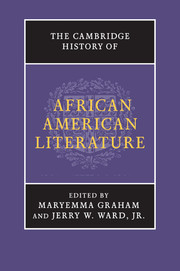Book contents
- Frontmatter
- Introduction
- PART I AFRICAN AMERICAN LITERATURE FROM ITS ORIGINS TO THE TWENTIETH CENTURY
- 1 Sounds of a tradition: the souls of black folk
- 2 Early print literature of Africans in America
- 3 The emergence of an African American literary canon, 1760–1820
- 4 Dividing a nation, uniting a people: African American literature and the abolitionist movement
- 5 African American literature and the abolitionist movement, 1845 to the Civil War
- 6 Writing freedom: race, religion, and revolution, 1820–1840
- 7 “We wish to Plead our own Cause”: independent antebellum African American literature, 1840–1865
- 8 Racial ideologies in theory and practice: political and cultural nationalism, 1865–1910
- 9 The “fictions” of race
- 10 “We Wear the Mask”: the making of a poet
- 11 Toward a modernist poetics
- PART II AFRICAN AMERICAN LITERATURE IN THE TWENTIETH CENTURY
- PART III AFRICAN AMERICAN LITERATURE AS ACADEMIC AND CULTURAL CAPITAL
- Bibliography
- Index
- References
2 - Early print literature of Africans in America
from PART I - AFRICAN AMERICAN LITERATURE FROM ITS ORIGINS TO THE TWENTIETH CENTURY
Published online by Cambridge University Press: 28 May 2011
- Frontmatter
- Introduction
- PART I AFRICAN AMERICAN LITERATURE FROM ITS ORIGINS TO THE TWENTIETH CENTURY
- 1 Sounds of a tradition: the souls of black folk
- 2 Early print literature of Africans in America
- 3 The emergence of an African American literary canon, 1760–1820
- 4 Dividing a nation, uniting a people: African American literature and the abolitionist movement
- 5 African American literature and the abolitionist movement, 1845 to the Civil War
- 6 Writing freedom: race, religion, and revolution, 1820–1840
- 7 “We wish to Plead our own Cause”: independent antebellum African American literature, 1840–1865
- 8 Racial ideologies in theory and practice: political and cultural nationalism, 1865–1910
- 9 The “fictions” of race
- 10 “We Wear the Mask”: the making of a poet
- 11 Toward a modernist poetics
- PART II AFRICAN AMERICAN LITERATURE IN THE TWENTIETH CENTURY
- PART III AFRICAN AMERICAN LITERATURE AS ACADEMIC AND CULTURAL CAPITAL
- Bibliography
- Index
- References
Summary
In 1986, the literary critic William L. Andrews argued for the multiple registers on which antebellum slave narratives signify. The “free” story they tell recounts both the physical journey from slavery to freedom and also the more subtle struggle to write independently, especially in light of the prevailing racial attitudes in antebellum America that might distort black authorship. Insofar as this model imagines the scene of literary production as the arena of racial collaboration and conflict, it is useful for thinking about early black print literature – but only up to a point. This literature cannot simply be lumped together with the more canonical works of the antebellum period as a way of tightly suturing the continuities within the African American literary “tradition.” It emerged at a distinctive historical moment, and its formal and thematic complexity arises largely from that moment. This is a literature about movement – geographical, ontological, and rhetorical. As a way of accounting for this fluidity of personae and identities, Paul Gilroy has argued that we should reexamine our assumptions about the place of “race” and “nation” in this literature and read it instead in light of the “transcultural international formation” that he calls the “Black Atlantic.” This includes the areas through which black subjects traveled as both free personae and bonded servants: the West African littoral, Britain, British America, eastern Canada, and the Caribbean.
- Type
- Chapter
- Information
- The Cambridge History of African American Literature , pp. 39 - 51Publisher: Cambridge University PressPrint publication year: 2011



